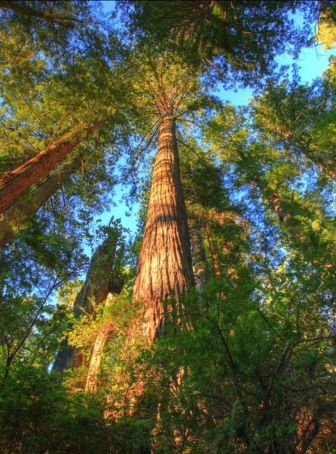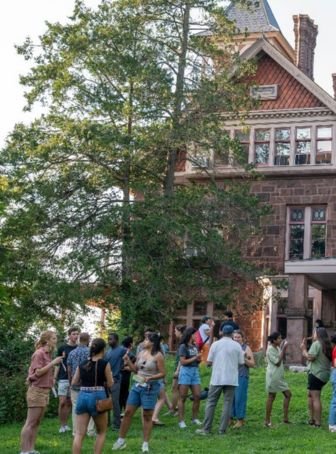
In the beginning of 2022, The Forest School at the Yale School of the Environment welcomed its newest program, the Yale Applied Science Synthesis Program (YASSP). Professor of Soils and Ecosystem Ecology Mark Bradford and Professor of Silviculture and Forest Ecology Mark Ashton had a vision of forming a group of scientists dedicated to synthesizing research data concerning forests and land-use. Their intention was to provide and communicate these research findings to policy and decision makers to help drive sustainable land use practices.
Over the course of creating YASSP, public interest and concern over forestlands has heightened. In April, President Biden signed an executive order on strengthening the nation’s forests, communities, and local economies. The order calls for “conserving old-growth and mature forests on Federal lands while supporting and advancing climate-smart forestry and sustainable forest products” as well as for “climate-smart reforestation for the benefit of Americans today and for generations to come.”
From this flowed a public commenting period on the definitions of “old-growth” and “mature” forests. Singer and songwriter Carole King penned an op-ed in The New York Times urging Biden to sign an executive order to halt commercial logging on public land. Comedian and political commentator Jon Oliver heavily criticized current carbon offset mechanisms and markets, which are tied to the growing call to reserve old-growth and mature forests for their carbon storage potential. Enthusiasm and concerns about forest management are now everywhere.
All the while, Dr. Sara Kuebbing, research scientist and research director of YASSP, is organizing the program to “work across these spaces and help bring these conversations together.” Kuebbing has noted two separate – and incomplete – narratives taking place around forest management. One, King’s favored ‘hands-off’ approach and another, Oliver’s skepticism about using carbon markets to fund forest protection. Both narratives overlook that forests can be managed in sustainable ways that can store carbon, protect biodiversity, and support wood product demands and local economies. Through YASSP, Bradford, Kuebbing, and their team are set on bringing together the available data to help guide sustainable forest management to preserve diversity while exploring best practices for production and the potential for carbon crediting, while recognizing that no one-size management approach fits all. In fact, The Forest School’s research and education is rooted in place-based science that considers the socio-ecological realities and needs of specific forest communities; YASSP is applying this approach to forest management practices.
Since The Forest School is located in the U.S. Northeast, YASSP has direct access to forest research in this region as well as a strong academic and practitioner network. Because of The Forest School’s legacy and reputation in forest management, YASSP has been invited to participate in the U.S. Department of Energy’s “Roads to Removal.” This national report is outlining the strategies to remove carbon dioxide from the atmosphere. This broad project includes many scientists and labs, covering agricultural and forested landscapes.
Ashton, Bradford, Kuebbing, and alumnus Mark Ducey ’90 YC, ’92 MFS, ’96 PhD, chair of natural resources and environment at the University of New Hampshire, have been tapped to work on the forest section of this report, providing strategies to guide the nation in carbon drawdown related to forests. They are joined by doctoral students at the School Reid Lewis ’20 MF and Thomas Harris, who are researchers of dry western and southeastern forests, respectively. Postdoc Weir Lu is leading the northeastern forest case study, with additional guidance from Joe Orefice, lecturer and director of forest and agricultural operations at Yale Forests. Together, they are ensuring that YASSP – pulling from the expertise across labs at The Forest School – is providing case based, regional syntheses that consider the nuances of differing forest types and the strategies needed for particular places. They hold that approaches in Connecticut may not be appropriate in Arizona or South Carolina, a challenge to creating a national plan.
“My hope is that our analysis can determine tractable policy interventions that can motivate more funding and resources to flow to sustainable forest management” says Kuebbing. The opportunity to work on the national “Road to Removal” report, which is expected in September 2023, shows the “true applied nature of our work.” Kuebbing remarks that this work also illuminates the challenges other groups are facing in addressing climate change and adaptive forest management.
YASSP, in all of its projects on agroecosystem and forest management, aims to create these hubs and ecosystems of researchers and data. Whether it is evaluating the impacts of commercial reforestation in Latin America or understanding silvopastoral practices, carbon sequestration, and livestock production, YASSP is dedicated to connecting people and resources.
Simultaneously, YASSP is also co-organizing a fall speaker series at the Yale Forest Forum, “What Makes a High-Quality Forest Carbon Credit?” This series brings together experts on forest protection and management related to carbon credits to provide an informational guide – not recommendations for buying or selling credits. From here, YASSP hopes to identify additional needs where their researchers can engage on key scientific questions regarding forest carbon credits.
YASSP is in itself a practice of stepping down from the ivory tower to draw upon rich knowledge and networks of land managers actively working in forests, farms, and other natural areas. It is also a continuance of the origins of forestry at Yale, whose mission was to use the best-available science to guide sustainable forest stewardship.







